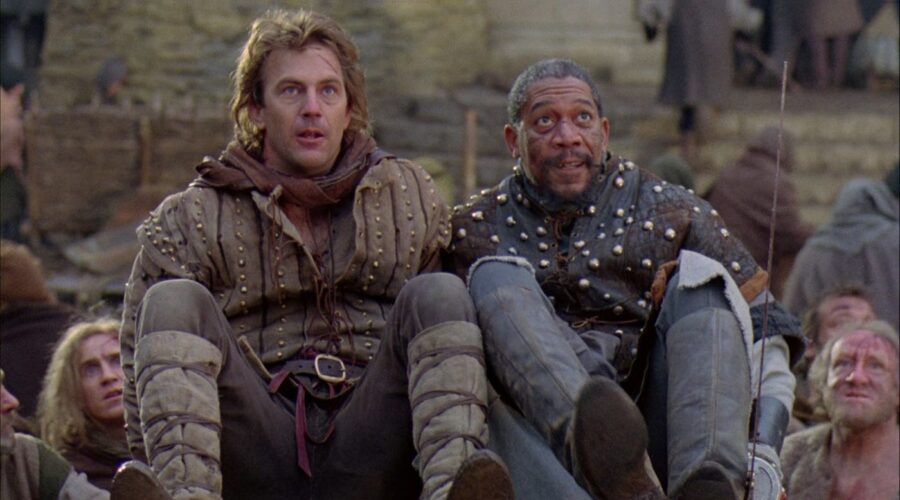Since my father died, I will occasionally sit down and re-watch some of his favorite movies (and usually force my son to do so as well. He complains about everything being “vintage,” but he usually gets pulled in by the 15-minute mark or so), and none have struck me so much as Robin Hood: Prince of Thieves lately.
Prince of Thieves and the Mel Brooks parody of it, Robin Hood: Men in Tights, are truly the only good Robin Hood films of my generation. Ridley Scott screwed up his version when he took a brilliant script and had it re-worked rather poorly, and I frankly can’t remember all of the other ones.
I know what you’re thinking, Kevin Costner’s Robin Hood had a mullet and an American accent. Plus, the Bryan Adams power ballad accompanying the production is endless. People tear their hair when I mention how much I’ve grown to love this movie again, since re-discovering it.
Well, I am here to tell you that those people are WRONG. Because Prince of Thieves works best as a kind of carnival ride, a trip to the Renaissance Fair, misplaced accents and all.
Costner is nicely muted, demonstrating true American cultural supremacy, Alan Rickman, the Sheriff of Nottingham, has amazing high-school-drama-hell-week energy, Morgan Freeman has the gravitas of a beloved Nintendo character, and Mary Elizabeth Mastrantonio is an ethereal sprite.
Years later, it works. It’s got that weird Game of Thrones hoodoo, without the repeated child murder and other emotional torture. It’s a work that exists outside arguments about good taste, the way that a lovingly crafted cheeseburger exists outside them too.
Prince of Thieves is also fantastic when it comes to the smaller characters, whether it’s the smarmy Christian Slater as Will Scarlett, or the Sean Connery cameo that pulls everything together. It’s like a treasure chest of plastic-but-pretty gems, a brilliant Halloween costume of a movie.
It also gave us the aforementioned Mel Brooks parody, which seems oddly more dated by comparison, but still gives us a great performance in Cary Elwes (“because *I* can speak with an English accent”), a young Dave Chapelle, and the line, “Blinken! Fix your boobs! You look like a bleeding Picasso!”
I enjoy a lot of Very Serious Cinema. Tarkovsky’s Stalker changed my life when I first watched it, and has been changing it ever since the way all great art does, opening up from different angles. I once infuriated a toxic ex by making him watch the films of Andrey Zvyagintsev. I am addicted to Paolo Sorrrentino.
But more often than not, my favorite films are those that transcend the demands of seriousness. The movie I consider most perfect and most beloved is Terminator 2: Judgment Day, which caused shock and consternation in my undergraduate thesis advisor. I don’t even agree with the concept of having “no fate,” a phrase Sarah Connor famous carves out with her knife (I am a cheerful fatallist, or usually cheerful, anyway), and yet that film is the summation of my entire life philosophy: do what you must, love across time, fight the inevitable.
This is why I’ve been able to look at Prince of Thieves with a new lens recently as well. The seemingly worn-out concept of freedom it champions — “if you would be free men, then you must fight” — is like an old leather glove that fits, especially these days. The values that we most hold dear are like that, they seem cringe in comparison to internet irony, but they hold up. Sincerity outlasts embarrassment.
The first time I ever took my son to a Renaissance Fair with our family — it was a staple of my childhood and that of my brother’s, but very new to this kid — he said something interesting: “This is like being in a video game.” He meant it as a high compliment. His aesthetic senses had already been shaped differently from mine, he saw shades of Zelda everywhere, and my beloved Skyrim, and Assassin’s Creed. Nothing was historically accurate (and anyway, he has yet to learn about any of the appropriate history), but it *made perfect visual and narrative sense to him*.
When he watched Prince of Thieves a year later, he had similar things to say, and I had honestly been prepared for the fact that the 15-minute mark would not do its magic on him at all. Instead, he watched the entire thing, popcorn in hand, then casually remarked that Kevin Costner “sort of reminded him of Link” (that’s from the Zelda games, if you don’t play them).
Link is a muted hero, and an entrancing one. He’s powerful, and also remote. That remoteness works across mediums, it turns out. What I bonded over with my father, I now bond over with my son, and that says something about the quality of so-called low brow cinema.

